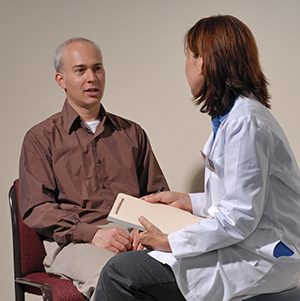LGBTQIA+ Health
People of any sexual orientation or gender identity can face health problems. LGBTQIA+ people may be at a greater risk for health problems. This is because they may not always see a healthcare provider when they need to. Or they may not know any providers who understand the LGBTQIA+ community. It may be that they feel embarrassed, have had a bad experience, and fear judgment. Or they may have a provider who is uninformed. In addition, state laws vary on care that a LGBTQIA+ person may receive. Some states have passed laws limiting or preventing medical care for transgender youth.
Here are some health issues to be aware of and talk about with your provider.

Hormone issues
While transitioning, you'll take hormones to achieve masculine or feminine effects. Those hormones carry risks:
-
Low or high blood pressure
-
Blood clots
-
Increasing cholesterol or triglyceride levels
-
Stroke
-
Heart disease
-
Certain cancers
-
Fluid loss (dehydration) and electrolyte imbalance
-
Liver damage
-
Thicker blood (increased hemoglobin)
Sometimes a transgender person buys hormones from a nonmedical provider. This may be because the therapy isn't covered by insurance. Or it could be because the person doesn't want to get medical care. This can result in taking the wrong hormone or the wrong dosage. And this may increase the chance for serious harmful effects. To limit the risks, a healthcare provider should closely keep track of hormone therapy with blood levels and physical exams.
Cancer
Trans people are at a slightly higher risk of developing some cancers that are tied to hormone use. The breasts, uterus, ovaries, prostate, lung, colon, or liver can be affected. This depends on the stage of transition.
Your routine healthcare should include screenings such as prostate, breast, and pelvic exams. You might face challenges dealing with healthcare issues. But don't delay or skip these exams. Not getting preventive screening could result in a delay in the diagnosis and treatment of any cancer.
Mental health issues
LGBTQIA+ people often have mental health issues as they struggle to identify with their sexuality. You may have a hard time sharing such personal information with family and friends. You may worry about how loved ones will react. Or you may feel lonely because you don't want to tell anyone, even those close to you. You may feel depressed or anxious because of this lack of support or acceptance from your friends, family, or community. In addition, LGBTQIA+ people may face discrimination, social stigma, harassment, and violence not seen by people who identify as heterosexual. But if you don't get attention and treatment, your risk for suicide or having a serious mental health problem may increase.
Sexually transmitted infections
Sexually transmitted infections (STIs) include human papillomavirus (HPV), hepatitis A and B, HIV, syphilis, chlamydia, and gonorrhea, among others. Most STIs can be treated. But some can be fatal. They can affect people no matter what their sexual orientation is. As with any group, some LGBTQIA+ people may not want to practice safe sex. And some may have lifestyles that increase their risk. Having safe sex can limit your chances of getting or passing on an STI. Get medical care right away at the first sign of symptoms. Don't put off a visit to the healthcare provider because you're embarrassed or fear judgment.
Substance abuse
LGBTQIA+ people often have substance abuse problems. These include tobacco, alcohol, and illegal drugs. The reason may be partly that people in this group face complex personal, family, and societal challenges as they strive to find their place in society.
Heart disease
Obesity, smoking, and hormone use are common among LGBTQIA+ people. These factors put a person at risk for heart disease, heart attack, and stroke. You should get regular checkups to help prevent heart disease. Take steps to control health conditions like high blood pressure, high cholesterol, and obesity. Live a healthy lifestyle.
Obesity
An unhealthy body weight can contribute to many health problems. These range from depression to cardiovascular disease. A healthy lifestyle should be a part of any LGBTQIA+ person's daily routine. Try to get regular exercise. And follow a healthy diet to get to and stay at a healthy weight.
Set up a good relationship with a healthcare team. This can help keep you in good physical and mental health.